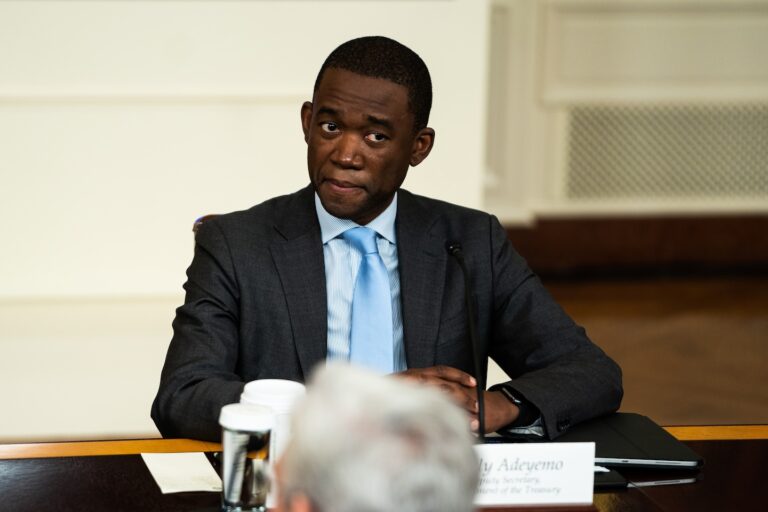“These transactions generate no economic activity for the United States,” Deputy Treasury Secretary Wally Adeyemo said. “Their only purpose is to reduce taxes.”
Adeyemo said preventing improper basis shifting could increase tax revenue from partnerships by at least $5 billion per year over the next decade.
Get caught up in
Stories to keep you up to date
A partnership is a “pass-through” business structure for consolidated entities that passes profits and losses directly to investors instead of being taxed at the corporate level. If a partnership sells an asset, such as land or equipment, taxes are determined only after deducting the asset’s original cost, or “basis,” from the proceeds.
Certain rules in the tax code allow partnerships to recalculate their basis as other assets move in and out of the business, and the IRS argues that partnerships regularly manipulate the basis of assets to avoid taxes.
In some cases, a company may depreciate the same asset repeatedly.
“You depreciated the asset in one legal entity, so your basis is zero,” says Mark Luscombe, a tax attorney at Wolters Kluwer who sits on the American Bar Association’s Committee on Partnerships. “If you sell it, you’ll make a big profit and won’t need to depreciate it. If you sell it to a related party instead, you can start the depreciation process all over again.”
Existing rules require that a transaction have “economic substance” and not just reduce taxes, and a senior IRS official said the economic substance rule is at the root of the agency’s belief that most of these closely-related partnership transactions are illegal.
“Taxpayers may believe their transactions meet the literal regulations,” said the official, who spoke on condition of anonymity to discuss the new rules before specific regulations are announced, “but they have no economic substance. We believe they are illegal under current law.”
The agency will issue guidance for accountants and lawyers to make clear that the federal government believes basis shifting for the purpose of avoiding taxes is illegal and subject to audits, it will propose regulations to require large partnerships to provide details to the IRS when certain transactions occur, and it will create teams within the agency’s legal department and large corporate audit division to focus on such partnerships, some of the hundreds of auditors the agency has hired this year.
IRS Commissioner Danny Wurfel said in a conference call with reporters that his new agents have already uncovered numerous instances of basis shifting that appear to be illegal. “In the audits we’re conducting today, we’re seeing systematic basis shifting where there is no economic justification for the transactions,” Wurfel said. “This will not be tolerated.”
If Adeyemo’s projection of $50 billion in additional tax revenue over 10 years comes to fruition, it would go a long way toward recouping the billions of dollars in additional funding Congress allocated to the IRS at Biden’s urging. The Biden administration and other officials argue the investment will pay for itself as new auditors hired with the money crack down on wealthy tax evaders.
The Biden administration said in a statement Monday that the rate-changing schemes, pushed by top lawyers and accountants who are paid millions to prepare complex tax returns for these companies, have likely surged in popularity in recent years but went unnoticed by the IRS until recently. Filings by pass-through companies with more than $10 million in assets increased 70% in the 2010s, rising to nearly 300,000 in 2019.
“Partnerships are the business form of choice for most new businesses, including some pretty large and successful ones,” said Michael Sardar, a partner at Kostelanetz LLP, who represents companies under IRS audit. “It’s an area that’s seen a lot of growth in terms of the value within the partnership. People think of big rogue corporations, but that may not be an appropriate image today, because there’s a lot of money in partnerships.”
Meanwhile, the cash-strapped IRS has gone from auditing 3.8 percent of large partnerships in 2010 to just 1 in 1,000 by 2019.
Wurfel said the tax agency decided to focus specifically on basis shifting because auditors it hired this year found that partnerships currently under audit had hidden tens of billions of dollars in assets to avoid taxes.
Robert Kovatcheff, an attorney at Miller & Chevalier who represents the partnerships being audited, argued that the companies may not have done anything wrong because the tax code allows for basis changes. He said the agencies’ proposed new rules will probably be challenged in court.
“I don’t think this is tax evasion,” Kovatchev said. “There are shades of fraud there, but I don’t think there’s any of that here. This is a tax planning tool in accordance with what Congress authorized.”
The IRS alone cannot stop the standards shift, Kovatchev argued. “If Congress wants to change the rules prohibiting related party basis transfers, it can do so, but it’s Congress’s job to do that,” he said.
But Luscombe said the IRS doesn’t need additional congressional approval to crack down on many of the attempts to change the rules because under the current system, “these transactions are likely fraudulent.”

